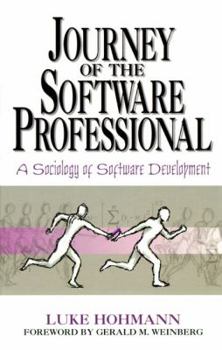Journey of the Software Professional: The Sociology of Computer Programming
Select Format
Select Condition 
Book Overview
A comprehensive guide to the software development process that will help software developers at every stage of their career: improving personal performance, learning to work well in a team, and... This description may be from another edition of this product.
Format:Paperback
Language:English
ISBN:0132366134
ISBN13:9780132366137
Release Date:January 1996
Publisher:Prentice Hall
Length:449 Pages
Weight:1.75 lbs.
Dimensions:1.0" x 6.3" x 9.3"
Customer Reviews
5 ratings
Wonderful JAVA break reading.
Published by Thriftbooks.com User , 22 years ago
Java break, Oh - it's a bad pun. but with a subtitle of "A Sociology of Software Development" one would think this is a dissertation. May be it was. But it's a good read. However it may take several times to get the most of it.I recommend this for every software engineer. Managers buy it for the whole group, start them out with a plan, to develop as a person.David
Therapy for post-dot-com mania.
Published by Thriftbooks.com User , 22 years ago
I first discovered this book thanks to the happy confluence of serendipity, perpetual bookstore browsing, and two decades of white-knuckling it as a software programmer. For the past few years it has given comfort and advice. Again today I am purchasing a copy as a gift for the shrink who is nursing me following the burst of the dot-com bubble. If I were on a desert island I would first wish for this book.
Effective techniques for software professionals
Published by Thriftbooks.com User , 23 years ago
Luke Hohmann explains three aspects of the software development journey: inward focus, outward focus, and upward focus. Principles from psychology are used to demonstrate how the reader can achieve personal growth and develop skills as an engineer or manager. Practical advice for staff and management is prominent at the end of each chapter. Cognitive models, values, personality, goals, culture, strategy, rituals, future perfect thinking, domain experience, competency frameworks, learning styles, training plans, the Johari Window, organizational cohesion and coupling, topology, and roles are discussed in the context of software engineering. The structure, process, outcome (SPO) framework for organizing a software project is a constant thread.
A software manager's "must read"
Published by Thriftbooks.com User , 24 years ago
Journey of the Software Professional is an impressive work. It begins with a Forward by noted author Gerald Weinberg (The Psychology of Computer Programming, etc.) where Weinberg says "In many ways, it opened my eyes. If you are a software professional, I think it will open yours as well." I couldn't have said it better. This book should be read by software development managers before their first assignments. Hohmann not only provides software engineering guidance and wisdom in real-world context but also, where possible, backs up his thinking with published works, all carefully annotated. What separates this work from most software engineering texts is Hohmann's ability to keep the work meaningful and relevant to real-world development environments. Many other texts note that most shops are at an SEI Level I maturity yet those same books delve into COCOMO II or McCabe's cyclomatic complexity--concepts and practices foreign in those same shops. It is easy to fill books with details of these and other software engineering tools and techniques but unless these things are placed in a meaningful context, they are simply tools absent of purpose. What Hohmann offers is much more: a way to think about the real problem to be solved by engineering management: the maturation of the software development department. It is along these lines that Hohmann shines. For example, in one section discussing conflict, Hohmann asks "How much time, if any should be allocated to the schedule to allow programmers to rework their code?" Refactoring (Fowler) is a new spin on how to accomplish this but acknowledging, at a management level, that such activities go on is not widely discussed in most texts. Hohmann challenges readers to think about problems such as these. Throughout the book are sections entitled "Advice to Managers" and "Advice to Developers". Most of the advice is rock solid and could apply anywhere for the same reason The Mythical Man Month (Brooks) is still relevant and should be required reading by all software managers: software development is (and always has been) about people! While tools and techniques evolve quickly, people have not. Because every author wants to bring something new and fresh they'll introduce some spin on their particular approach. Hohmann offers SPO: Structure-Process-Outcome to fulfill this pension. While I think it doesn't add much, neither does it detract. There is plenty in this book to let it stand on its own merit. I didn't agree with everything in this book. There are few books I can give blanket and unreserved approval to, in fact. But this book did do what Weinberg promised in his Forward: it made me THINK. The book's subtitle is "A Sociology of Software Development" and that description fits well. It is not a substitute for a solid book on software engineering techniques. But, I believe this book would greatly supplement anyone's library whose quest is to better understand the discipline.
Thought provoking with good ideas
Published by Thriftbooks.com User , 27 years ago
I have really enjoyed reading this book. It is packed full of information. For example there are sections on personality types and problem solving approaches, as well as sections on creating teams from disparate personalities and the challenges of building teams.I found this book thought provoking and a good introduction to a wealth of information on sociology issues in software development. People issues are important in team development of software, and most of us will have to work in teams for a large part of our careers. The bibiography is large, good for following up on topics of particular interest.I don't expect to use everything in the book, but will pick and choose what is appropriate in each particular situation.





